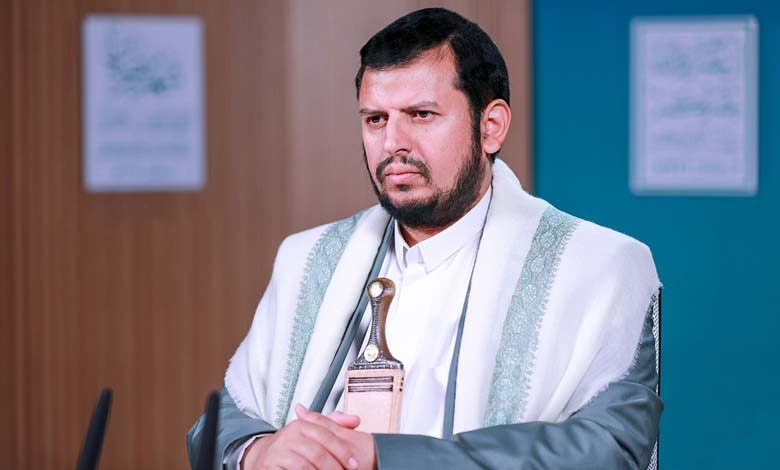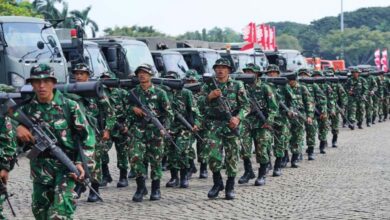Israel Threatens Houthi Leader With the Fate of Sinwar and Nasrallah

Israeli Airstrikes Hit Two Ports in Yemen in Ongoing Campaign Against Houthi Supply Lines
On Friday, Israel intensified its strikes against the Iran-aligned Houthi movement by targeting the Red Sea ports of Al-Hodeidah and Al-Salif in Yemen. The operation is part of an ongoing campaign to disrupt the Houthis‘ military capabilities by cutting off key supply routes.
In a stark warning, Israeli officials said the group’s leader, Abdul-Malik al-Houthi, could face the same fate as Yahya Sinwar, the former Hamas commander, and Hassan Nasrallah, Hezbollah’s Secretary-General—both reportedly killed by Israeli operations in 2024.
-
Houthi Leader Admits Iranian Support and Threatens Israel
-
The Muslim Brotherhood Officially Endorses Houthi Attacks on Israel: What is their stance after more than 80 yemenis were killed and injured?
The Israeli army declared that the targeted ports were being used to transfer weapons and reiterated its warnings for civilians to evacuate those areas.
Residents in Al-Hodeidah reported hearing four loud explosions and seeing smoke rising from the port following the Israeli airstrikes.
In a joint statement, Prime Minister Benjamin Netanyahu and Defense Minister Yoav Gallant said:”If the Houthis continue launching missiles at Israel, they will face severe consequences. We will also strike their leaders.”
They added that Abdul-Malik al-Houthi could soon join the list of figures eliminated by Israel.
-
Houthis expand threats to ban all ships heading to Israel
-
Houthi Attacks Threaten the Aden–Sanaa Lifeline: Civilian Suffering Deepens
Despite a recent truce with the United States regarding attacks on American vessels, the Houthis have continued targeting Israel with missiles and drones, framing their actions as support for Palestinians in Gaza.
Israel has responded with repeated airstrikes, including one on May 6, which damaged Sanaa International Airport and caused multiple casualties.
The Houthis are part of the “Axis of Resistance” led by Iran, which includes Hezbollah in Lebanon, Hamas in Gaza, and other regional militias. They currently control around 60% of Yemeni territory.
-
Houthi Attacks Threaten the Aden–Sanaa Lifeline: Civilian Suffering Deepens
-
Yemeni Fears over Houthi Exploitation of U.S. Truce
Since the Israel-Hamas war began in October 2023, the Houthis have launched dozens of drones and missiles toward Israel, though most were intercepted or fell without hitting targets.
Following the latest Israeli airstrikes, Nasr al-Din Amer, deputy head of the Houthis’ media office, stated on platform X:”As millions of Yemenis marched in solidarity with Gaza, the Zionist enemy launched aggressive raids on the ports of Al-Hodeidah.”
He added:”This people will not bow, will not retreat, and will not abandon Gaza—even if the entire world does. We are in an open war with the Zionist entity. Our operations in support of Gaza will not cease. The blockade on Israeli ships will continue, and we will maintain efforts to impose an air siege on their airports.”
-
Washington’s Secret Battle: Who’s Behind Houthi Financing?
-
Second Attack Within Hours: Israel Announces Interception of Houthi Missile
The strikes followed two evacuation warnings issued by the Israeli military earlier in the week to personnel in the ports of Ras Issa, Al-Salif, and Al-Hodeidah, though no immediate action had followed.
According to Maariv, Israel had previously avoided striking Yemen during former U.S. President Donald Trump’s presence in the region, fearing regional escalation. The attacks resumed once Trump left.
This marks Israel’s ninth airstrike on Yemen since October 7, 2023, and the third since hostilities resumed on March 18, 2024, following a two-month pause.
-
An Oil Lifeline in Houthi Hands… Ras Issa in the Eye of the Storm
-
State of Panic and Anxiety among Houthi Terrorist Militias… Precautionary Measures Taken
Israeli media reports suggest that Israel faces major intelligence-gathering challenges in Yemen, especially regarding the location of Houthi leaders and military sites. As a result, it has frequently targeted civilian and economic infrastructure, including cement factories, power stations, seaports, and Sanaa International Airport—often repeatedly.
Domestically, criticism is growing within Israel regarding the effectiveness of these strikes, which have failed to deter Houthi operations.
On May 5, the Houthis claimed to have launched a hypersonic ballistic missile at Ben Gurion Airport, injuring eight people and prompting mass evacuations to shelters.
-
“Tightened Measures”: Houthi Militias Hide Their Leader from “American Hell”
-
U.S. Strikes Yemen… Russia Calls for Dialogue, and Iran Threatens
The following day, Israel retaliated by destroying Al-Hodeidah port in a series of raids, then launching a broad attack on Sanaa, targeting the airport, major power stations, and a cement plant.
According to the Houthis, the raids killed seven people and injured 94. Flights from the airport, suspended after the attack, resumed on Thursday.
On May 6, Donald Trump announced a ceasefire deal between the Houthis and the U.S., brokered by Oman—a move Israeli officials called “unexpected.”
However, the Houthis clarified that this truce does not include Israel.












